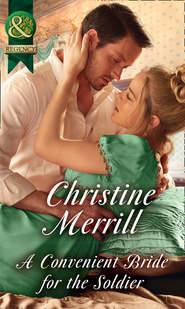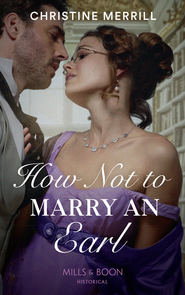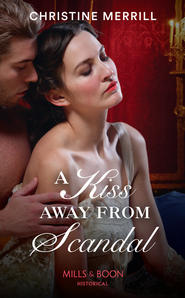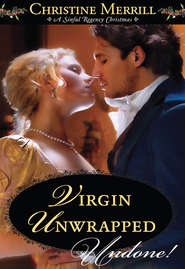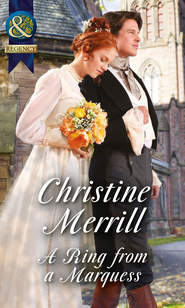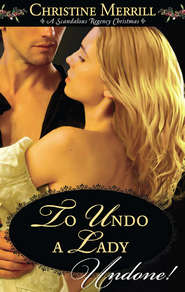По всем вопросам обращайтесь на: info@litportal.ru
(©) 2003-2024.
✖
Dangerous Lord, Innocent Governess
Настройки чтения
Размер шрифта
Высота строк
Поля
Sophie smiled in relief, and climbed up on to the chair, taking the pencil eagerly and stroking it and the paper as though they were more precious than china dolls.
Then Daphne went back to allowing the boy to teach her his Greek. Edmund continued to recite, this time with a tired voice that said that he understood well what she was trying to do, and that the whole thing bored him to tears.
There was a limit to this, she thought, before it became plain to everyone that she had no idea what she was doing in a classroom. When she had hatched the plan, she had thought that she might occupy the children for a few weeks before they caught on to her ruse. But if they had tumbled to her within hours?
The Duchess was right. They were as sharp as needles. Too clever for their own good. But since the house made little effort to hide its secrets, perhaps she would not be here long.
And what was to happen to the children, if that was so? They seemed just as stubborn about remaining in the house as their father did in sending them to school. But if their father would admit to his crime, and accept punishment for it?
Then they would have to go somewhere, wouldn’t they? They could not remain in the house alone. Perhaps the Duchess would see to their education. She had no children of her own, and she seemed most fond of them.
What happened to them did not really matter, she reminded herself. For they were no concern of hers.
But perhaps they were. They were Clare’s children, as well as Lord Colton’s. There was a family connection to her. Perhaps she could persuade her father to take them in. Clare’s parents could not do the job. They’d seemed to care little enough for what had happened to the mother, once she was off their hands. Why should they want a good home for their grandchildren?
If she meant to disrupt their lives further in the name of justice, she held some responsibility in seeing that they were cared for. She must give the matter more thought.
Edmund reached the end of his passage and returned to his seat.
‘Very good,’ she said. ‘You read well. Let us see how you write.’ She went to the shelf, and pulled down another book, and gave him a page from Homer to translate. ‘And, Lily, why don’t you work on your maths? Since you seem to be managing well, you may work at your own pace.’ Then she wandered to the window to check on Sophie. ‘Have you finished your drawing, little one?’
The girl nodded eagerly, and held the paper out to her.
And Daphne dropped it in revulsion as she got a look at the subject.
It was Clare. Or what had been Clare. There was no mistaking the fact, for the rendering was skilful, even in the hands of a five-year-old. It was a woman’s body, dead at the foot of the staircase, arms and legs at odd angles, and a head that was curiously misshapen.
Daphne crumpled the paper and threw it to the floor.
Sophie drew back in alarm, sure that she had done wrong and trembling as she awaited punishment.
The older girl gave her a look of bitter triumph. ‘It serves you right for giving her the pencils. Our first governess ran screaming to Papa. The next one called her a devil. And the last one tried to beat the devil out of her, until Papa caught her at it and sent her away.’
Daphne took a deep breath and scooped up the paper from the floor, straightening out the wrinkles and laying it back on the table. ‘Since I did not assign her a subject, I have little right to complain about the finished work.’ She tried to ignore the subject matter and focus on the execution. Then she looked down at Sophie. ‘I would not normally give lessons so advanced to one as small as you. But it is clear from looking at it that you have more than normal abilities for a child of your age.’ She crouched down beside the girl and urged her back into her seat.
Sophie looked at her in confusion, tears in her eyes, still half-expecting punishment.
‘It is all right,’ Daphne said. ‘You needn’t worry. I love to draw as well. And I know how comforting it can be to sit with pen and paper, especially when one has something on one’s mind. Unless I tell you otherwise, you may draw whatever you wish. Is that all right?’
The girl gave a hesitant nod.
Daphne steeled herself to look again at the wrinkled sketch. ‘You have a good eye for detail and your proportions are fair. But no one has taught you about light and how to draw it.’
The girl gave her a puzzled look.
She smiled back encouragingly. ‘You might think that there is nothing to see in empty air. But it is possible for the artist to show the light, by showing the shadows. Let us put figure drawing aside for now, and start with something simple, like an apple.’
She took a blank sheet of paper, and drew a rough fruit, then showed Sophie how to choose a direction for the sun, and put in shading and highlights with a bit of chalk. Then she offered the paper back to the girl. ‘Now you try. Begin with round things, like apples. And then try something with angles, like the bookcase or the window frame.’
Sophie looked at her with growing amazement, as though these were the first words she had understood in hours. And then she smiled and took the pencil back in her hand, placed a fresh sheet of paper on the table and bit her lip in determination, bending eagerly over her work.
Daphne watched the older children, who were exchanging looks of surprise and confusion, as though she had interrupted the perfectly intelligible Greek with a language they could not understand. She turned to them, hands on her hips. ‘I suppose this is as good a time as any to see how you children draw. Lily, show me your watercolour book.’
‘I do not have one.’ The girl was almost stammering in embarrassment.
Daphne fought down the feeling of triumph. ‘You do not draw?’
‘It is hardly necessary, for if one knows maths and languages…’ Edmund said in a starchy tone.
‘Your father knows those things, I am sure. And how to draw, as well. He enjoys gardening, does he not?’
‘He is a botanist,’ said Lily, as though deeply offended by the slight.
Daphne waved it aside, not much caring about the difference. ‘Then he must know enough drawing to render the plants he works on.’
The older children’s eyes grew round, as though they had never considered the fact.
‘And I doubt he would like to hear that you are dismissing any element of your education as frivolous. We must work to correct our ignorance, rather than making excuses for it.’ And now it was her turn to be surprised. That last had sounded rather like something her school mistresses had said to her. Perhaps all that was necessary to turn oneself into an educator was to starch one’s bodice and put on a stern expression.
She smiled at the children so as not to appear too forbidding, remembering the minimal effect such lectures had had on her. ‘For now, you may continue with the lessons you have. But in future, we shall see that you gain some talent for art.’ She smiled at Sophie, who was dutifully drawing an apple from memory. ‘After I have got the more advanced student properly settled.’
The little girl turned to her with such a look of surprise on her face that it almost made her forget her role and laugh. But then Sophie smiled, as though the words were better than rubies to her. With such talented siblings, she had never been the star pupil.
And if what the older children had said was true, she had endured far worse since Clare had died. So it helped her to draw horrible pictures to help recover from her mother’s death. Was there really any harm in it? Daphne picked up the sheet of paper, considered throwing it on the fire, and then smoothed it and set it aside. If it was destroyed, the poor girl would only draw it again.
She stared down at the image of her cousin, crumpled in death. The girl had drawn it from memory, just as she had the apple. Had no one the sense to keep her away, so that she did not have to see such a horrible sight? But the picture was very informative, for it showed just what she had expected: Clare lying on her back as though she had toppled backwards, and not fallen face first as one likely would if the death were accidental.
Without realising it, Sophie might help to prove her mother’s murder.
Chapter Four
Daphne took the picture and placed it between the pages of her own sketchbook. It was too disturbing to hang on the schoolroom wall, but the information in it was too important to discard. She would conceal it for now, then take it to her room where she might examine it in detail. She encouraged the children to work on what they wished, and gave only the barest supervision, assuming that they would come to little harm reading from their texts.
At lunch time, Cook delivered trays of food to the nursery dining room, and they paused in their lessons to eat. The same seemed to hold for tea, and would happen at supper just as Mrs Sims described. The household had given the children no reason to come below stairs at all, if they did not wish to. She wondered if the intent was to keep them away from their father. For if it was, it told the real truth about the loyalty of the servants to their master. They would support him, of course. They took his side in what had happened to his wife, and frowned on gossip about it.
But they feared him, feared for the children and kept them far out of his path.
When a maid had come to clear away the tea things, and they were almost ready to return to the classroom, she noticed a shadow from the doorway that fell across the room.
Lord Colton was there, observing them. She had not heard him approach, and could not shake the feeling that he had been standing there for quite some time, unnoticed. It put her on her guard. Though she doubted he had seen or heard anything of interest, it was disquieting to think him so adept at spying.
‘Miss Collins.’ He gave the same curt bow he had given her on the previous day, and she feared he was ready for another disquieting battle of wills.
Before he could catch it, she broke her gaze, and gave another curtsy, eyes downcast to hide her discomfort. ‘Lord Colton.’
‘How are the children today?’
‘Very well, my lord.’ She hoped that she was not expected to go into detail on their progress, for she had nothing to add.






